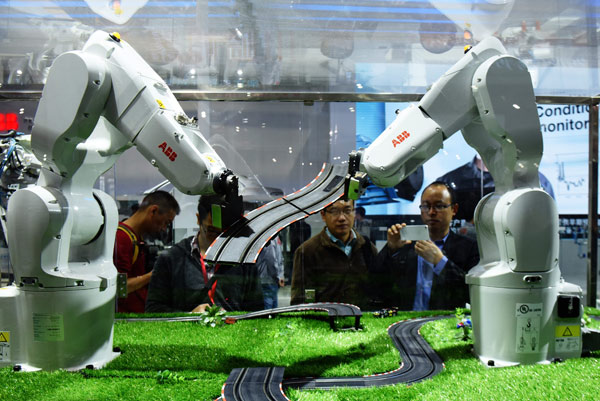
Visitors watch ABB robots build a model at an exhibition in Shanghai. (Photo by Long Wei/For China Daily)
Swiss engineering group company ABB Group said it wants to get involved in Chinese EPC projects-or engineering, procurement and construction contracts-connected with the Belt and Road Initiative, to secure long-term returns.
EPCs are contracting deals where the project contractor is responsible for all the activities from design, procurement, construction, to commissioning and the handover of the project to the owner or end-use.
Countries such as Russia, Pakistan and Turkey-as well as countries in the Middle East and Africa-are pushing to improve their power and infrastructure sectors, a trend which is attracting the attention of both Chinese and international companies.
The initiative has brought new opportunities in overseas projects for Chinese EPC companies. Chinese companies invested $14.5 billion in infrastructure, power and service projects in countries and regions related to the Belt and Road Initiative last year, according to data from the Ministry of Commerce.
"Because of our presence in China and also in most of economies where the Belt and Road Initiative is taking place, we can help Chinese companies understand the needs and requirements of those markets," Claudio Facchin, president of ABB's power grid division.
He added that his group could also help them with optimal practical solutions in terms of a project's cost, financing, life cycle and environment.
Facchin said that ABB has been participating in the Chinese State Grid's vision to build a global energy interconnection by 2050, that can connect power grids around the world with cleaner and greener energy.
Zhou Min, vice-president of international engineering branch of Guangdong Electric Power Design Institute Co Ltd, said that even though Chinese companies are engaging in a large number of EPC projects abroad, many of them only considered the profits to be made.
But Zhou said that with build-operate-transfer projects and Public-Private Partnership modes becoming more and more popular, the Chinese companies are now also taking into account other factors, such as a projects' life cycle and long term returns-as they also began to operate what they had built overseas.
"Like our coal-fired power plant in Vietnam, we worked with ABB because they provided a complete solution," Zhou added.
"China has over 4,000 EPC (projects) abroad, with over 100 of them involving the power business," said Zhang Jinquan, head of ABB China's power grids division.
"We will provide them with support ... that complies with local standards."


















































